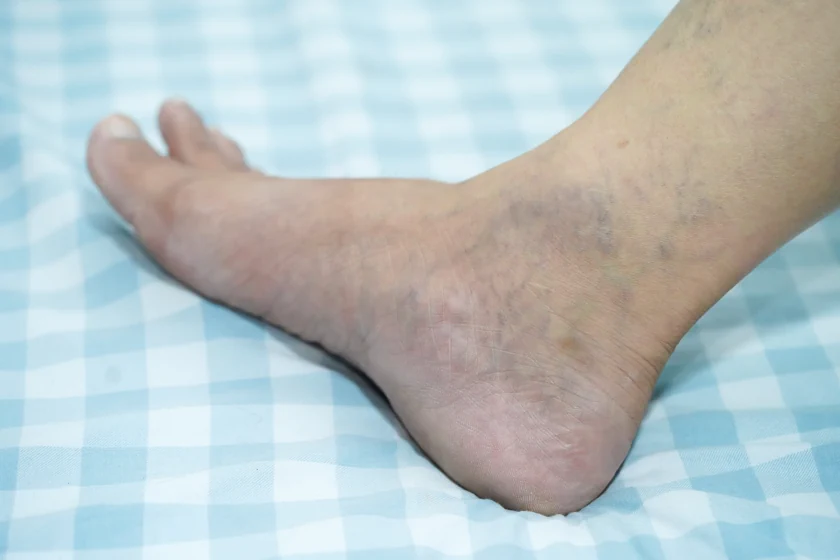
Varicose Eczema: Symptoms, Causes, and Treatment Options by the Best Vascular Surgeon in Vadodara
As a vascular surgeon, one of the most common conditions I encounter in patients with chronic venous insufficiency is varicose eczema. It’s often misunderstood as a simple skin condition, but in reality, it’s a complex issue tied to varicose veins.
In India, where lifestyle changes and aging are contributing to an increase in venous diseases, varicose eczema is affecting a growing number of people. While the condition may start with mild discomfort, if left untreated, it can lead to significant complications such as ulceration.
Early intervention is key to managing symptoms effectively and preventing further deterioration.
What is Varicose Eczema?
Varicose eczema, also known as stasis dermatitis, is a type of chronic skin inflammation that primarily affects the lower legs. It develops as a result of poor blood circulation, particularly in individuals with varicose veins or other venous diseases.
When the veins in the legs fail to return blood to the heart effectively, the blood pools in the lower limbs, leading to increased pressure in the veins. This pressure damages the skin and underlying tissue, causing inflammation, discoloration, and irritation—hallmarks of varicose eczema.
Though varicose eczema is not life-threatening, it is a chronic condition that tends to worsen over time if not managed properly. If ignored, it can lead to painful ulcers and infections that are difficult to treat. According to studies, nearly 20% of people with chronic venous insufficiency will develop some form of varicose eczema during their lifetime.
Symptoms of Varicose Eczema
Varicose eczema symptoms often start subtly but can escalate quickly without treatment. Here’s what to watch out for:
- Itchy, red, or scaly skin on the lower legs and around the ankles
- Discoloration of the skin, often brown or purple patches
- Swelling in the lower legs or ankles, especially after standing for extended periods
- Tightness or heaviness in the legs due to poor circulation
- Dry, flaky skin that may crack or ooze
- Open sores or ulcers that are slow to heal in severe cases
Many patients mistake these symptoms for simple dry skin or rashes. However, if you have varicose veins and experience these signs, it’s likely that you’re dealing with varicose eczema. In some cases, the symptoms can worsen, leading to intense pain and discomfort.
What Causes Varicose Eczema?
The primary cause of varicose eczema is chronic venous insufficiency (CVI), a condition where the veins in the legs are unable to pump blood back to the heart effectively. This occurs when the one-way valves in the veins, which are designed to prevent blood from flowing backward, become weakened or damaged. As a result, blood pools in the lower legs, leading to increased pressure in the veins.
This increased venous pressure damages the small blood vessels in the skin, causing inflammation and, eventually, varicose eczema. While varicose veins are the most common trigger, other factors such as obesity, pregnancy, deep vein thrombosis (DVT), or a sedentary lifestyle can also increase the risk of developing this condition. People over the age of 50 are particularly susceptible, especially women.
How Is Varicose Eczema Diagnosed?
Diagnosing varicose eczema involves a thorough clinical examination. During the consultation, I often ask patients about their medical history, focusing on venous disorders, family history, and lifestyle factors such as activity levels. In most cases, the appearance of the skin—discolored, swollen, and inflamed—along with visible varicose veins is enough to make a diagnosis.
However, to confirm the underlying cause, a Doppler ultrasound is typically performed. This non-invasive test helps assess the blood flow in the veins and identifies areas of venous insufficiency. In some cases, if ulcers or open sores are present, further tests may be required to rule out infections.
How to Prevent Varicose Eczema
Preventing varicose eczema primarily revolves around improving circulation in the legs and managing the risk factors associated with venous insufficiency. Here are some of the most effective ways to reduce your risk:
Stay active: Regular exercise, especially walking, stimulates blood flow in the legs and prevents blood from pooling in the veins.
Elevate your legs: Raising your legs above the level of your heart several times a day reduces pressure in the veins and helps with circulation.
Wear compression stockings: These specially designed stockings help support the veins and improve blood flow, reducing the risk of eczema.
Maintain a healthy weight: Obesity puts additional pressure on the veins, increasing the likelihood of developing varicose veins and eczema.
Avoid prolonged sitting or standing: Long periods in one position can worsen venous insufficiency. Try to move every 30 minutes to keep the blood flowing.
Risk Factors for Developing Varicose Eczema
Several factors increase the risk of developing varicose eczema. Age, as previously mentioned, is a significant factor, with people over the age of 50 at a higher risk. Other risk factors include:
- A family history of venous diseases or varicose veins
- Obesity, which adds pressure to the veins in the legs
- Pregnancy, as hormonal changes and increased blood volume can weaken veins
- Occupations that require long periods of standing, such as teaching or nursing
- A sedentary lifestyle, where inactivity slows circulation
How Is Varicose Eczema Treated?
Treating varicose eczema involves managing the underlying venous insufficiency and alleviating the skin symptoms. In mild cases, treatment may include topical corticosteroids to reduce inflammation and moisturizers to combat dry, flaky skin.
For moderate to severe cases, it’s essential to address the venous issue directly. Compression therapy, such as wearing compression stockings, is a mainstay of treatment as it improves circulation and reduces swelling. In some cases, patients may require more invasive treatments like sclerotherapy or laser treatment to treat varicose veins, improving blood flow and relieving pressure on the skin.
Here’s a real-life example from my practice: A patient came in with varicose eczema that had progressed to an ulcer. With timely intervention, including compression therapy, topical treatments, and later a venous ablation procedure, we were able to manage the eczema and heal the ulcer. This underscores the importance of addressing the root cause—varicose veins—along with treating the skin condition.
For patients with chronic varicose eczema, lifestyle changes and ongoing treatment are critical. Regular follow-ups with a vascular surgeon ensure that any complications are addressed promptly.
Conclusion
Varicose eczema is a common but often misunderstood condition that stems from chronic venous insufficiency. While the symptoms can range from mild itching to painful ulcers, the key to managing this condition is addressing the root cause, poor circulation due to varicose veins. With timely treatment, including lifestyle changes, compression therapy, and in some cases, more advanced procedures, varicose eczema can be managed effectively.
If you’re experiencing any signs of varicose eczema, don’t wait for the symptoms to worsen. Early diagnosis and intervention are crucial. Consult the best varicose vein doctor or a vascular surgeon in India to prevent complications and protect your skin and overall health.
FAQs
Common symptoms include itchy, red, or scaly skin, swelling in the lower legs, brown or purple discoloration, and the development of ulcers in severe cases. If you experience these symptoms and have varicose veins, it’s likely you have varicose eczema.
Varicose eczema management includes improving circulation through compression stockings, elevating your legs, staying active, and using prescribed creams or ointments. More severe cases may require vein treatments like sclerotherapy.
Yes, varicose eczema can cause pain, particularly in advanced stages where the skin becomes ulcerated or infected. Patients often describe a heaviness or aching sensation in the affected leg.
While varicose eczema is a chronic condition, its symptoms can be managed with proper treatment, and further complications can be prevented. Addressing the underlying venous insufficiency can help keep the condition under control.
You should consult a vascular surgeon in India if you experience persistent leg swelling, pain, or signs of varicose eczema such as skin discoloration, itching, or ulcers. Early intervention can prevent more serious complications.

MBBS, MS, MRCS, DNB-Fellow
Dr. Sumit Kapadia
Dr. Sumit Kapadia / MR KAPADIA SUMIT a gold-medalist from Baroda Medical College, obtained his general surgical training and senior residency from SSG Hospital, Vadodara.

MBBS, MS, MRCS, DNB-Fellow
Dr. Sumit Kapadia
Dr. Sumit Kapadia / MR KAPADIA SUMIT a gold-medalist from Baroda Medical College, obtained his general surgical training and senior residency from SSG Hospital, Vadodara.



